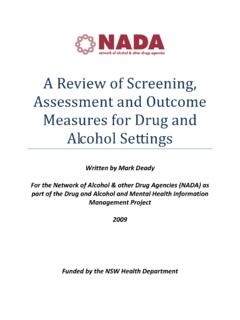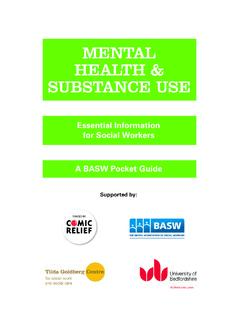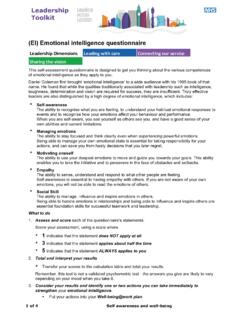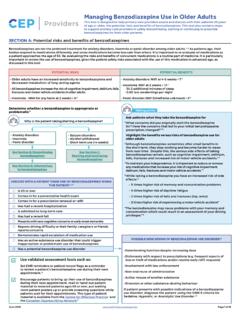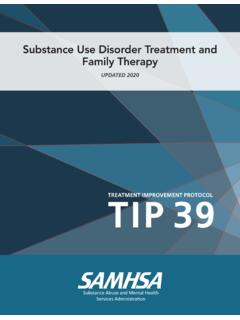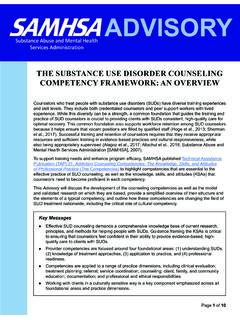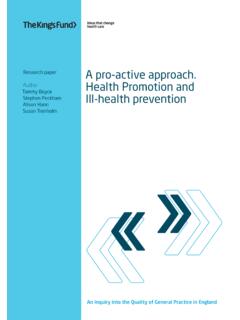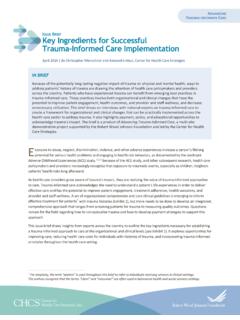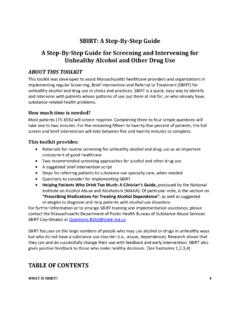Transcription of Mental Health Assessment Tools - Drugs and Alcohol
1 Mental Health Assessment ToolsLaois Offaly Longford Westmeath Mental Health Edition 2012 Mental Health Assessment Tools1 Contents:Section 1: Mental Health screening Tools Mini- Mental State Examination (MMSE) ..11 KGV (Modified) Symptom Scale ..17 Risk Assessment Summary Department of Psychiatry, Portlaoise ..65 Risk Assessment Tool Longford/Westmeath Depression/Anxiety/Stress Scale (DASS) ..67 PSYRATS Hallucinations Subscale ..75 PSYRATS Delusions Subscale ..81 Geriatric Depression Scale (GDS)..87 Beck s Depression Inventory (BDI) (*redacted) ..91 Beck s Suicidal Intent Scale (BSIS) (*redacted) ..95 Beck s Hopelessness Scale (BHS) (*redacted) ..101 Beck s Anxiety Inventory (BAI) (*redacted) ..104 Anxiety Rating Scale (Zung) ..107 Rosenberg Self Esteem Evaluative Belief Scale ..112 Sleep Scale ..114 Section 2: Medication Related screening Tools LUNSERS Side-effect rating scale.
2 119 DAI - Drug Attitude Inventory (DAI 30)..127 Section 3: Addiction screening Tools MAST - Michigan Alcohol screening Tool (MAST 25) ..131 DAST - Drug Abuse screening Tool (DAST 20)..135 AUDIT The Alcohol Use Disorders Identification Test ..137 CAGE - Alcohol Misuse screening *redacted due to copyrightMental Health Assessment Tools2 Section 4: Living Skills screening Tools Life Skills Profile (LSP 20) ..145 Social Functioning Scale (SFS) ..157 BARTHEL Index of Daily Living ..175 Social Network Map (SNM) ..177 Camberwell Assessment of Need (CAN)..180 Relative Assessment Interview (RAI)..190 Section 5: Making sense of the Assessment data Incorporating Assessment data in care planning using the Stress Vulnerability Framework Model (SVM) ..200 Guideline for integration of Assessment Tools in care planning.
3 206 Disclaimer Although all reasonable care has been taken in preparing the information published in this Portfolio, the authors do not guarantee the accuracy of it. The Duthors cannot be held responsible for any errors or omissions and accept no liability whatsoever for any loss or damage howsoever arising. Permission is granted, for the printing of Assessment Tools from this Portfolio for use in clinical practice with the exception of the %HFN V WRROV and the CAN which are subject to copyright. The Dssessment Wools/scales do not in any way replace clinical decision making. They are intended as an adjunct to assist in the process of Assessment . Practitioners should be prepared to use their clinical judgement to make decisions regarding which tool/scale is appropriate and useful for each client/patient and the often rapidly changing needs of that person.
4 If any errors/omissions are noted please contact the Mental Health assessments group via e-mail at: Mental Health Assessment Tools3 Mental Health Assessment Tools4 Mental Health Assessment Tools5 Introduction The Mental Health Commission (2005) specifies the importance of individualised care planning as one of the key aspects of holistic service delivery with each service user having an individual care and treatment plan that describes the levels of support and treatment required in line with his/her needs. Effective skills of Assessment are fundamental to nurses working in the Mental Health setting (Curran and Rogers, 2004, Gamble & Brennan, 2006). The Commission on Patient Safety and Quality Assurance (2008) advise that clinical effectiveness based on outcome/performance measurement, using evidenced based practice is a standard requirement in healthcare.
5 Having validated assessments in nursing practice complies with this standard. This revised Portfolio of Assessment is the work of the Mental Health Assessment Review Group. The review has built on the first publication and taken account of audit results from the experience of using the Tools in practice and relevant national and international literature. It is intended that any professional in the Mental Health services can utilise relevant and appropriate Tools /scales from this portfolio. Effective care delivery relies on a comprehensive Assessment being made. The use of validated Assessment Tools enhances Assessment and can be incorporated into the management of patient/client care in a variety of ways. They can be useful LQ providing evidence for clinical decisions. They are also useful where potential risk is suspected and can be used to measure the level of risk.
6 The use of validated Assessment Tools is crucial to providing documentary quantifiable evidence of patient/client state of Health and determining the SDWLHQW FOLHQW V progress/difficulties with theLU plan of care. The Portfolio is presented in five sections outlining various components of care. These are: o Mental Health screening Tools o Medication 5 HODWHG screening Tools o Alcohol /Drug screening ToolV o Living Skills screening Tools o Making sense of the Assessment data. This guides users on how to incorporate information into practice using a Stress Vulnerability Framework from a psycho social model with strong emphasis on a recovery ethos with a useful guideline on integrating Assessment data into the process of care. Each measuring tool/scale is accompanied by explanatory notes for guidance on use. Supporting literature is provided and all Tools /scales are referenced.
7 The portfolio is available to view and download from the HSE Lenus Library website: Mental Health Assessment Tools6 The following are the Mental Health Assessment Tools Review Group: Mr. Michael Hyland, CNM111 6W /RPDQ V +RVSLWDO 0 XOOLQJDU &R :HVWPHDWK Ms. Louise Johnson, PCLN, Mental Health Services, Midland Regional Hospital Tullamore 7 XOODPRUH &R 2 IIDO\ (up to September 2010) Ms. Mary Kerrigan, CNM11, CMHC, Green Road, Mullingar &R :HVWPHDWK. Mr. Jim Maguire, Lecturer at Department of Nursing and Health Sciences, $WKORQH ,QVWLWXWH RI 7 HFKQRORJ\ $WKORQH &R :HVWPHDWK. 0V &ODUH 2 &RQQRU, CNS, Department of Psychiatry, Midland Regional Hospital Portlaoise &R /DRLVH. 0U 0 LFN 2 +HKLU, ADON, Tullamore Sector Services, CMHC, Bury Quay, Tullamore &R 2 IIDO\. Ms. Margaret Daly, Regional NPDC, Mental Health Services, Longford Westmeath Laois Offaly (Chair) 201 If further information or additional advice is required please contact the Mental Health Assessment group via e-mail at: Mental Health Assessment Tools7 Mental Health Assessment Tools8 SECTION 1: Mental Health screening Tools Mental Health Assessment Tools9 Mental Health Assessment Tools10 MINI- Mental STATE EXAMINATION (MMSE) The Mini- Mental State Examination is a 30-point questionnaire used to detect cognitive impairment, assess its severity and to monitor cognitive changes over time.
8 Name of website: Mini- Mental State Examination URL: Country: USA Authors: Mini- Mental State Examination (MMSE ) by Marshal F. Folstein, MD, Susan E. Folstein, MD, Paul R. McHugh, MD. Copyright _ 1975, 1998, 2001 by MiniMental, LLC. Mental Status Reporting Software (MSRS) Checklist by Mark A. Ruiz, PhD, Richard J. Latshaw, MS. Brief Description: Copyright of the MMSE has been enforced so it is not possible to publish further information here. A sample report can be viewed at the website Psychological Assessment Resources (PAR) Inc ( ) by typing MMSE into the search box. WHY Cognitive impairment is no longer considered a normal and inevitable change of aging. Although older adults are at higher risk than the rest of the population, changes in cognitive function often call for prompt and aggressive action.
9 In older patients, cognitive functioning is HVSHFLDOO\ OLNHO\ WR GHFOLQH GXULQJ LOOQHVV RU LQMXU\ 7KH QXUVHV DVVHVVPHQW RI DQ ROGHU DGXOW V cognitive status is instrumental in identifying early changes in physiological status, ability to learn, and evaluating responses to treatment. BEST TOOL The Mini Mental State Examination (MMSE) is a tool that can be used to systematically and thoroughly assess Mental status. It is an 11 question measure that tests five areas of cognitive function: orientation, registration, attention and calculation, recall and language. The MMSE takes 5-10 minutes to administer and is therefore practical to use repeatedly and routinely. TARGET POPULATION The MMSE is effective as a screening tool for cognitive impairment with older, community dwelling, hospitalized and institutionalized adults. Assessment of an older adults cognitive function is best achieved when it is done routinely, systematically and thoroughly.
10 VALIDITY/RELIABILITY Since its creation in 1975, the MMSE has been validated and extensively used in both clinical practice and research. STRENGTHS AND LIMITATIONS The MMSE is effective as a screening instrument to separate patients with cognitive impairment from those without it. In addition, when used repeatedly the instrument is able to measure changes in cognitive status that may benefit from intervention. However, the tool is not able to diagnose the case for changes in cognitive function and should not replace a complete clinical Assessment of Mental status. In addition, the instrument relies heavily on verbal response and reading and writing. Therefore, patients that are hearing and visually impaired, intubated, have low english literacy, or those with other communication disorders may perform poorly Mental Health Assessment Tools11 even when cognitively intact.

